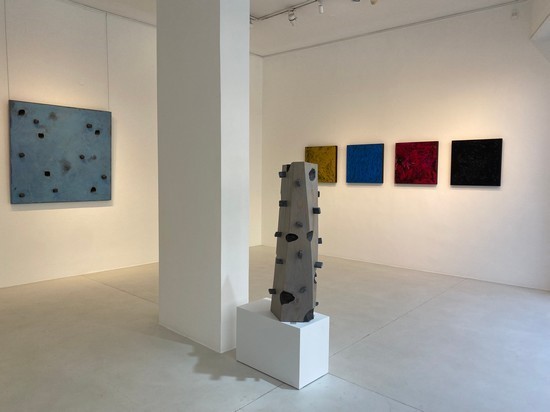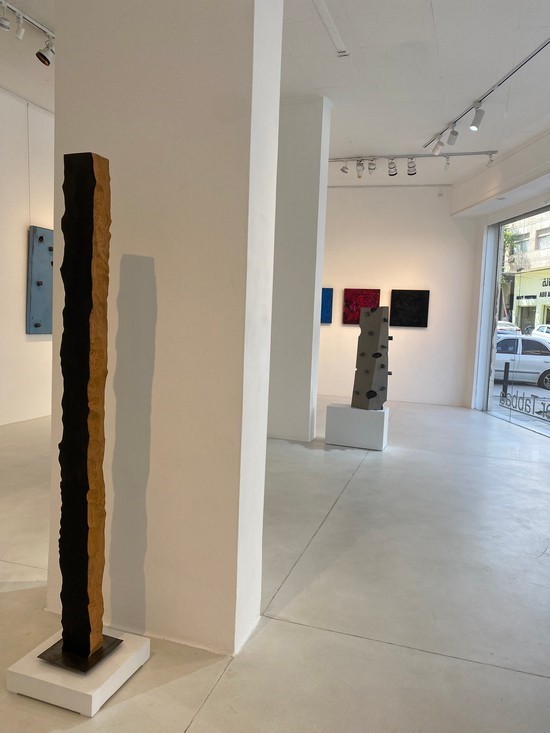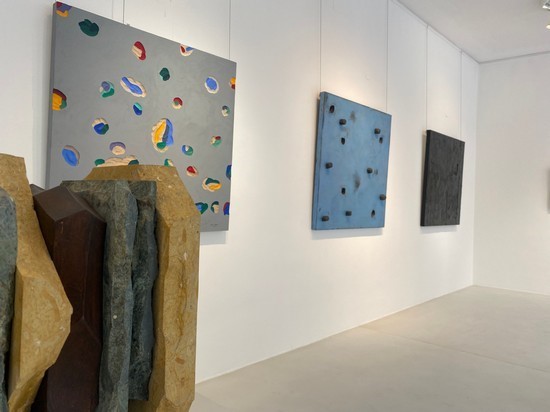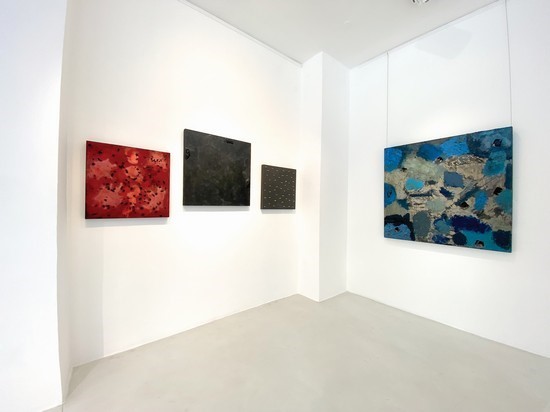“Refraction” is the name
Samer Tabbaa gave his latest exhibition, and seeing the amount of angles,
indentations, notches, and protrusions that constantly create new contours, and
the playful patches of color in his works, one can but agree that it is an apt
appellation.
اضافة اعلان
At a subtler level, the artist says he “chose this
title because I like to change my direction of thought in order to fit the
material I am working with at the time. … New lights through old visions”.
Tabbaa’s works, whether old or new, are unmistakably
his. Those on display now at
Karim Gallery range from 2007 to 2022; some elicit
that familiar, warm feelings old acquaintances do, the newest surprise with
their exuberant colors that might be an expression of relief after the taxing
period of the pandemic, a triumphant display of resilience and defiance whose
message is that humanity, after all, cannot so easily be vanquished and that
its legacy is here to stay.

The works — sculptures and sculptural paintings —
are elegantly projected against the white walls of the bright gallery. To
create them, the artist used a wide array of media with masterful control.
Wood, paint, tar, coal, stone, marble, metal, and acrylic are all compliant
materials in the artist’s hands that shape them in unlikely, highly tactile
forms of remarkable beauty.
The square works — encaustic and coal, graphite,
mixed media, or acrylic on MDF or wood — in colors as different as tar-black,
magenta, cobalt blue, yellow-green, or gold, but not only, are mostly in
relief, assume a sculptural quality rather than be two-dimensional paintings.
Evoking distant worlds of twinkling and swirling
stars, of immense depths in which space debris is pulled by some gravitational
force, Tabbaa’s bits of graphite, coal, or golden dabs of color “land” in a
sensibly chaotic pattern on the warm surface of his works, in patterns that
evoke lunar, barren landscapes of eerie beauty.
How long will they hang precariously on the surface
before another mysterious, stronger force pries them free and sends them
whirling in the atmosphere?
Is their delicate sturdiness hinting at our frail,
temporal life? Are they representations of the infinite cosmos? Are the images
renditions of the outer space, voracious black holes included, or more familiar
expanses of desert, dolmens, and all that may have lingered in the memory of
the artist’s genes?
Whatever they are, like a magnet, they pull the
viewer in a lulling embrace, entrancing and mesmerizing.

Two bigger images are quite playful. In one, small
black craters on blue background find some counterweight in the graphite chunks
placed haphazardly, yet artistically, on the wood, creating a lively dynamic.
The other, the most recent (produced in 2022), is a wooden panel in elegant
grey carved here and there; where the chisel bit, it left some sort of prints
that are partly painted in bright colors, creating an abstract work that is
refreshingly cheerful.
The labor of love of this artisan — for, Tabbaa is a
craftsman first and foremost — has produced a sober, yet happy, world in which
the viewer could immerse themselves for hours trying to read hidden messages
or delight in discovering the obvious.
Part of this world is made up of Tabbaa’s
sculptures, imaginative works artistically outlined against the space around.
He skillfully makes the matter comply with his will, not by brutally hewing it but by gently and knowingly following its natural grain and lines in harmonious synergy whose outcome is outstanding works of art.
Untitled all, the standalone or mounted sculptures
are made of wood, stone, marble, and MDF.
The mono-or polychromatic sculptures are
aesthetically pleasing, ingenious, highly decorative, and, at times,
deceptively simple.
One eye-catching work, made of a juxtaposition of
slabs of Jordanian stone, pinewood, and Mexican marble, could be taken for a
stack of books or a prehistoric monument whose meaning the posterity should
endeavor to decipher.

A vertical asymmetrically scalloped wooden structure
could be a primitive totemic pole or simply a column like the many left by
successive civilizations all around Jordan.
Another sculpture, a pastel gray slab of painted
wood with facets cut at most fascinating angles, and which could pass for a
fallen meteorite, has rectangular pieces of aluminum protruding here and there.
At intervals, depressions sink into edges, softening the sharp lines, changing
the shape — does not refraction happen this way? — and creating a most
intriguing sculpture that is rightfully given the pride of place in the center
of the gallery.

A wooden “bench” with slats at symmetrical angles —
one could almost hear the music produced by these piano tiles-like planks — is
highly decorative and cleverly complemented by a nearby wall-mounted sculpture
in blue-painted MDF and mahogany. The ingenious positioning of the pieces of
wood at different heights creates a playful dynamic, testimony to the
creativity of the artist.
The sculpture realized from half a tree trunk cut at
interesting levels shows perhaps best Tabbaa’s intimate understanding of, and
connection with, the material he masterfully interacts with.
He skillfully makes the matter comply with his will,
not by brutally hewing it but by gently and knowingly following its natural grain
and lines in harmonious synergy whose outcome is outstanding works of art.
The exhibition is on until June 12.
Read more Culture and Arts
Jordan News



